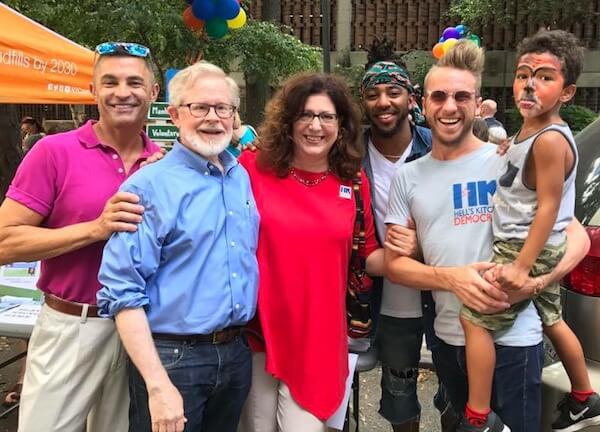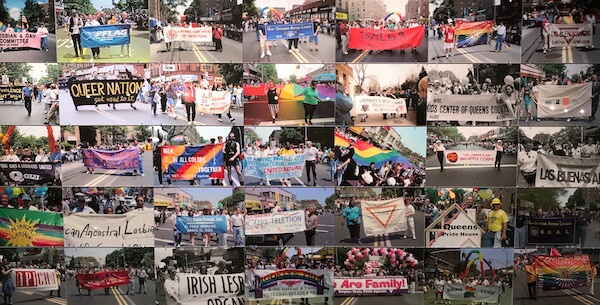ACT UP founder Larry Kramer speaks to Garry Kleinman. | YOON SEO NAM
In many ways, the issues are still the same,” mused Andrew Velez, one of the founding members of ACT UP, at a reunion bash held at 49 Grove in the West Village on June 22, more than 26 years after the activist group was launched.
He recalled that when the AIDS Coalition To Unleash Power was formed in March 1987, the exorbitant price of the drug AZT was a key rallying cry, bringing thousands of gay men and their allies to Wall Street to call for cheaper drugs and giving birth to a movement that would reach a global audience. In time, that ferment led to sweeping changes in the research and treatment of HIV/ AIDS — and other illnesses, as well.
While access to healthcare and medication for HIV/ AIDS remains a significant problem, Velez noted, today, as back then, trends among young, sexually active gay and bisexual men are cause for significant concern, as well. As Velez sat and watched more than 350 activists and well-wishers party and relive old times, good and bad, he observed that the epidemic is not only not over, it may be on a path to a new crisis. He is still active in ACT UP and said a major focus of the group today “is how infection rates are so high among young men who are having sex with men,” or MSMs.
West Village gathering draws 350 who recall common struggle, argue silence is no answer
Echoing a grim statistic repeated over and over by attendees at the evening’s festivities, Velez said that if current transmission rates in New York continue, close to 50 percent of young MSMs today will be infected by the time they are 40. The parallels between 1987 and now are so troubling, he fears a “tsunami wave” of epidemic proportions coming that will be “even worse than the 1980s.”
And another veteran of ACT UP noted, even as a re-emerging crisis is “sinking its claws into us, again,” many in the gay community act as if the HIV/ AIDS crisis is a relic of the past.
Activist Stephen Helmke makes clear the battle against AIDS is not over. | YOON SEO NAM
In recalling how ACT UP revolutionized the conversation about HIV/ AIDS, Gregg Gonsalves, who now works on global health and justice issues, said too many in the gay community have forgotten the “foot soldiers” of ACT UP and the significant role they played in advancing the larger gay rights project. The group did not simply bring the issues surrounding HIV/ AIDS to public attention and change the dialogue between patients and medical and research professionals, he said, it also altered the dialogue about the LGBT community in America.
“Gay America has forgotten its own foot soldiers in the war against AIDS,” he said. “We wouldn’t be having this conversation” about AIDS, he said, “if ACT UP didn’t place it in the face of modern America.”
Gonsalves was highly critical of the many LGBT organizations that have focused in recent years on issues like marriage equality and gays in the military while neglecting to educate the young about the health threat that continues to face them.
According to the most recent data from the New York City Department of Health and Mental Hygiene, as of December 2010, approximately 35 percent of those newly diagnosed with HIV/ AIDS are in the 20-29 age bracket. Close to 70 percent are black or Latino.
Many at the 49 Grove event believe the willingness of so many today to engage in risky sexual behavior is due in part to their age; they simply did not witness the bodies on the streets back then — the activists, the men scarred by illness, or those who were both. Widespread complacency is based on the mistaken belief that HIV/ AIDS is simply a matter of taking the medication, when in fact the medication can come with many side effects and does little to erase the stigma they will have to deal with because they are positive.
Former State Senator Tom Duane. | YOON SEO NAM
The thousands who could not attend, who had fallen during the epidemic, were also on the minds of many. In fact, it was the death late last year of Spencer Cox, a leading treatment activist, from AIDS-related complications that led organizers to plan what was originally billed as the ACT UP/ NY (Just Don’t Call It a Reunion) Reunion, but came to be known simply as REACT UP.
Gonsalves remembered his close friend as “brilliant and sweet.”
Cox’s death in December struck a symbolic chord, Velez said, not just because he was only 44 when he died, but also because he was one more reminder of the many who fell and who continue to die. He said their passing was somewhat akin to the trauma of the Holocaust in that the world will never know what those who died could have done with their lives had they lived.
Jim Eigo, an ACT UP veteran, reminded the audience that “after 26 years, we still have no cure for AIDS,” and solemnly noted that while 20 percent of those infected with the virus don’t know it, the figure among young people is more than twice that. It’s a statistic, he said, that brought him out of retirement as an AIDS activist, a remark that drew deafening cheers from the crowd and nostalgic chants of “ACT UP. Fight Back. Fight AIDS” — cries once commonplace from Wall Street to Washington DC, where in 1992 activists from the advocacy group scattered the ashes of loved ones through the White House gate onto its lawn to protest the lack of action by the Bush administration.
Less than five years after that protest, drug cocktails that represented a profound treatment breakthrough in the fight against HIV/ AIDS also marked what Velez called a “watershed moment” in the movement. The arrival of protease inhibitors saw membership fall, though he said infighting as well as racial divisions were also important factors in the decline of a group that once had hundreds of thousands of dollars bequeathed to it via insurance policies on those who died of AIDS-related causes.
Jim Eigo addresses the REACT UP attendees, as Gilbert Baker and Andy Velez look on. | YOON SEO NAM
John Voelcker, another early ACT UP member, said that it was burnout that brought about his exit, though he was quick to add that the advocacy group taught him everything he needed to know about activism.
Echoing Velez’s comments, former State Senator Tom Duane agreed that while much has changed in the fight against HIV/ AIDS and stigma, there is still a lot to be done.
“Sadly,” he said, “not enough has changed.” There are still, he noted, 33 states that punish people for exposing another person to HIV, while in Albany attitudes are much the same as they were when he was first elected to the Senate in 1998. Today, Duane said, many of his former colleagues don’t even like to talk in legislative chambers about “the dirty word” — sex — and that’s a problem when it comes to educating the young. In the current epidemiological climate, he argued, Albany’s attitude not only promotes apathy but also adds to the ignorance surrounding the disease.
More than 26 years after ACT UP first took its angry voice to places like Wall Street, Duane said, “silence equals stigma and silence equals a lack of education. So silence still equals death.”






































